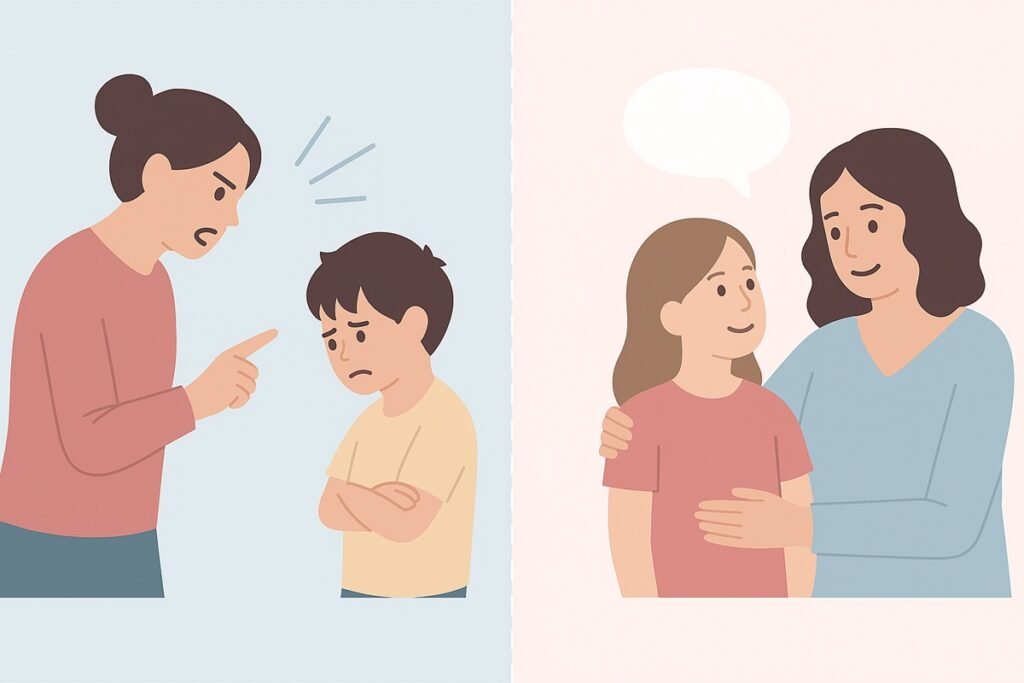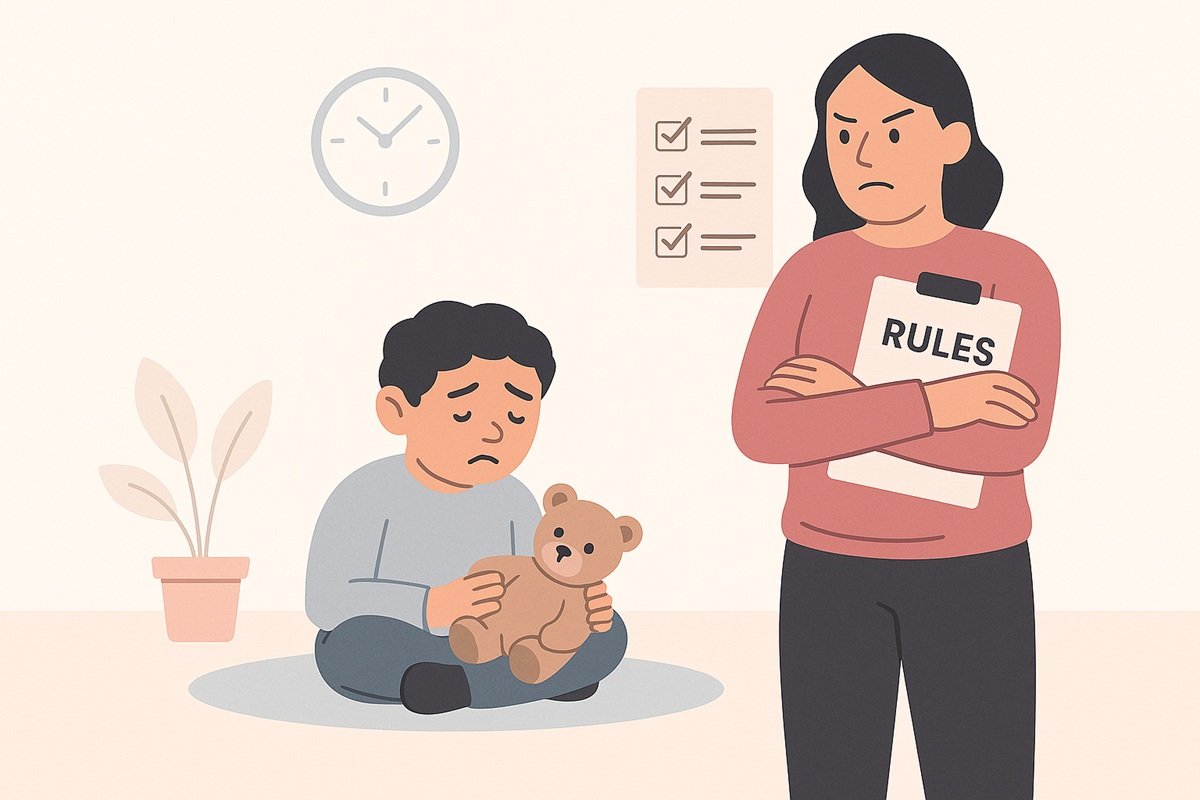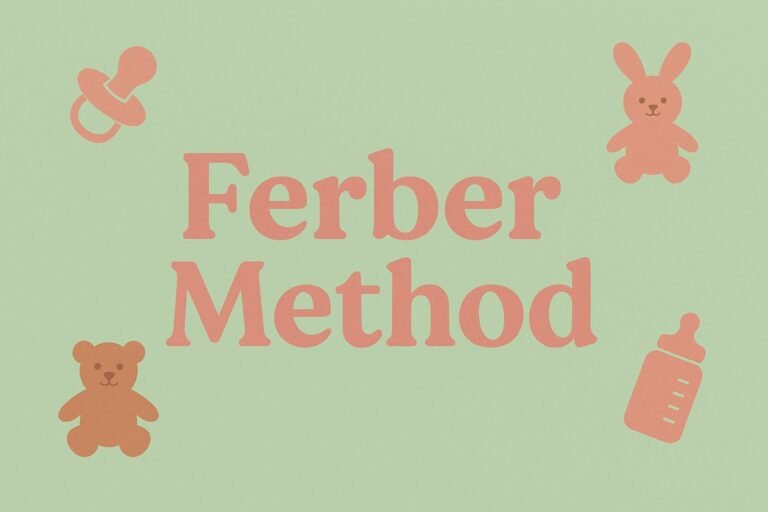Are you a strict parent who expects complete obedience without explanation? Do you find yourself using phrases like “Because I said so!” when your child questions your rules? If so, you might be using an authoritarian parenting style.
This approach to raising children has been extensively studied, and while it may seem effective in achieving immediate compliance, research shows that it can have significant, negative long-term effects on children’s development.
In this comprehensive guide, we’ll explore what authoritarian parenting is, how it compares to other parenting styles, its impact on children, and practical tips for parents who want to adapt their approach for better outcomes.
Table of Contents
What Is Authoritarian Parenting?
Authoritarian parenting is one of the four main parenting styles identified by developmental psychologist Diana Baumrind in the 1960s. This style is characterized by high demands and strict control over children, with little room for flexibility or open communication.
Authoritarian Parenting Definition
Authoritarian parenting refers to a method for raising and disciplining children that is dominated by high expectations and strict rules with minimal emotional warmth or responsiveness to children’s needs. According to research, authoritarian parents are often described as rigid rulers who demand obedience without question and rarely explain the reasoning behind their rules.
These parents typically believe in maintaining order through a set of demanding standards and use punishment rather than discipline to enforce compliance. The focus is on control and conformity, with little emphasis on nurturing a child’s independence or critical thinking skills.
Recent statistics reveal that as much as 49% of American parents are now choosing a more authoritarian parenting style than before, with significant regional variations across states. For example, states like Oklahoma (64%), Virginia (63%), and Arkansas (61%) show a high prevalence of stricter parenting approaches, while states like North Dakota (25%), Iowa (28%), and Colorado (34%) tend towards more permissive styles.
Authoritarian vs Authoritative Parenting

While these terms sound similar, they represent fundamentally different approaches to parenting.
Similarities:
- Both styles have high expectations and enforce rules.
- Both provide structure for children.
- Both expect children to follow guidelines.
Differences:
| Aspect | Authoritarian Parenting | Authoritative Parenting |
| Communication | One-way (parent to child) | Two-way dialogue |
| Rules | Strict rules without explanation | Clear rules with explanations |
| Control | High control with minimal flexibility | Moderate control balanced with autonomy |
| Warmth | Low emotional responsiveness | High warmth and support |
| Discipline | Punishment-focused | Teaching-focused consequences |
| Child input | Not valued or encouraged | Encouraged and considered |
Authoritarian Parenting vs Authoritative Parenting
Research shows that authoritative parenting leads to better outcomes for children. A number of studies have found that children raised by authoritative parents exhibit higher self-esteem and life satisfaction compared to those with authoritarian parents.
Characteristics of the Authoritarian Parenting Style
Authoritarian parenting is distinguished by several key characteristics that set it apart from other parenting approaches.
The typical features and behaviors of authoritarian parents include:
Strict Rule Enforcement
Authoritarian parents establish rigid rules that children must follow without question. These rules are typically non-negotiable and come with harsh consequences for disobedience. Parents in this category often believe that strict discipline is essential for proper child development and do not use efficient dialogue to understand their children’s needs and look for solutions together.
Limited Emotional Responsiveness
Unlike authoritative parents who balance discipline with emotional support, authoritarian parents tend to be less nurturing and affectionate. They may view the expression of emotions as a sign of weakness or believe that being too warm will undermine their authority. As a result, they usually appear to be cold and distant.
One-Way Communication
Communication in authoritarian households typically flows in one direction – from the parent to the child. Children are expected to listen and obey rather than engage in discussion or express their opinions. Questions or attempts to negotiate are often met with dismissal or phrases like “Because I said so.”
High Expectations Without Support
Authoritarian parents set very high expectations for their children inside and outside school but may not provide the necessary support or resources to help them succeed academically and otherwise. The focus of the parenting style is on achievement and obedience rather than the process of learning and growth.
Punishment Over Teaching
When rules are broken, authoritarian parents are more likely to resort to punishment rather than using the situation as a teaching opportunity. This can include physical punishment, withdrawal of privileges, or emotional tactics like shame or guilt.
5 Authoritarian Parenting Examples
Sometimes it’s hard to evaluate our own behavior including our parenting style.
To better understand how authoritarian parenting manifests in everyday situations and consider whether you might be applying some of the principles of this method, let’s consider the following examples:
Example 1: Homework Time
Scenario: A 10-year-old child is struggling with math homework.
Authoritarian Approach: “You need to finish all your homework before dinner, no excuses. If you don’t, you’ll lose screen time for a week. Other kids can do this, so why can’t you? Stop complaining and just do it.”
Example 2: Bedtime Resistance
Scenario: A 6-year-old doesn’t want to go to bed at the designated time.
Authoritarian Approach: “It’s 8:00 P.M. Go to bed now. I don’t care if you’re not tired or that your friend stays up later. In this house, you follow my rules. If I have to come back here, there will be consequences.”
Example 3: Food Preferences
Scenario: A 5-year-old child doesn’t want to eat certain vegetables at dinner.
Authoritarian Approach: “You will sit here until you eat everything on your plate. I don’t care if it takes all night. There are hungry children who would be grateful for this food. No dessert, no TV, nothing until you finish.”
Example 4: Social Activities
Scenario: A teenager wants to attend a party.
Authoritarian Approach: “Absolutely not. I don’t care if everyone else is going. I’ve decided it’s not appropriate, and that’s final. Don’t bring it up again, or you’ll be grounded for a week.”
Example 5: Academic Performance
Scenario: A 9-year-old child brings home a B+ on a test.
Authoritarian Approach: “A B+? What happened to the other points? You should have studied harder. No phone until I see an A on the next test. I expect better from you.”
Authoritarian Parenting Style Causes

Extensive research conducted over the years shows that there are multiple factors that result in the development of an authoritarian parenting style. While this method might seem too harsh and insensitive to many modern parents, it’s important to understand where the actions and reasons of authoritarian parents are coming from before putting all the blame on them.
The most common reasons behind authoritarian parenting comprise:
- Cultural Background: Some cultures traditionally value strict parenting as a way to show care and prepare children for a demanding world. Authoritarian parenting tends to be more common in certain ethnic communities and is sometimes viewed differently across cultural contexts.
- Personal Upbringing: Parents who were raised in authoritarian households often default to this style as it’s their primary model for parenting. Having said that, however, it’s key to note that in some cases being brought up in an authoritarian environment might have the opposite result and lead to authoritative or another type of gentle parenting as parents clearly appreciate the harmful consequences of their own parents’ practices and behaviors. In all cases, the parenting styles people experience during childhood significantly impact how they approach parenting with their own children.
- Environmental Factors: Living in dangerous neighborhoods or high-risk environments may lead parents to adopting stricter parenting as a protective measure against the dangers on the street. In this sense, authoritarian parenting can play an adaptive role for children growing up in unsafe neighborhoods.
- Personality Traits: Studies suggest that authoritarian parents tend to score lower on the personality trait of agreeableness and higher on neuroticism. These personality factors may predispose some individuals to more controlling parenting approaches.
- Stress and Work Demands: Parents under significant stress or with demanding work schedules might resort to authoritarian methods as a way to maintain order quickly and efficiently. In a way, their approach turns into a coping mechanism that, nonetheless, can have major, long-term impacts on their child.
- Fear of Modern Risks: With increasing concerns about technology, social media, and other modern challenges, some parents turn to strict control as a way to protect their children from perceived threats.
No matter the motivation behind authoritarian parents, their methods have significant effects on their children both in the short and the long run.
Authoritarian Parenting Effects and Implications on Children
Research has consistently shown that authoritarian parenting can have significant effects on children’s development across various domains. Unfortunately, most of these impacts are negative.
So, here are the most typical outcomes of this parenting approach:
Emotional Development
Children raised by authoritarian parents often struggle with emotional regulation and may experience:
- Higher rates of anxiety and depression
- Lower self-esteem and confidence
- Difficulty recognizing and expressing their feelings
- Increased risk of developing mental health issues
Overall, there is evidence that young adults who experience authoritarian parenting are more likely to be depressed than those raised by authoritative parents, underscoring the long-term emotional impact of this parenting style.
Social Development
The strict control associated with authoritarian parenting can affect children’s social skills and relationships, making them:
- Less socially competent with peers
- More likely to resort to aggression when facing conflicts
- Unable to engage in cooperation and compromise
- More dependent on authority figures for direction
- Incaapble of developing healthy relationships
Research by Dexian Li and colleagues involving over 2,300 children between ages 3-6 found that children raised by authoritarian parents were rated by their teachers as being less socially competent with their peers.
Cognitive Development
The emphasis on obedience rather than critical thinking can impact cognitive development. In specific, this can lead to:
- Less creativity and curiosity
- Reduced problem-solving abilities
- Lower academic intrinsic motivation
- Strong potential for higher academic achievement but driven by fear rather than interest and ambition
Generally speaking, the children of authoritarian parents tend to perform well in traditional subjects but might face serious difficulties in adapting to today’s environment and job market where creativity and critical thinking are driving competencies.
Behavioral Outcomes
Authoritarian parenting is associated with specific behavioral patterns, including:
- Higher likelihood to engage in rebellion during adolescence
- Higher rates of aggressive behavior
- Increased risk of delinquent behavior
Evidence points that authoritarian parenting has the highest correlation with child aggression, including bullying, among all parenting styles. Meanwhile, when children display anger or are unusually impulsive or withdrawn, parents are at a higher risk of adopting harsh practices, creating a cycle of behavioral issues that can be hard to break without significant efforts and potentially outside support and assistance.
Long-Term Implications
The effects of authoritarian parenting can extend into adulthood, causing:
- Difficulty with independent decision-making
- Challenges in relationships
- Lower life satisfaction
- Potential for repeating authoritarian patterns with their own children
Multiple studies conclude that exposure to authoritative parenting during childhood can be significantly correlated with higher life satisfaction compared to authoritarian or permissive styles.
Authoritarian Parenting Pros and Cons
While research generally favors more balanced parenting approaches, it’s important to consider both the potential advantages and disadvantages of authoritarian parenting to get a comprehensive understanding of the concept.
After all, it’s important to highlight that very few things are black and white in the world of parenthood, and individuals’ parenting styles are rarely clear-cut. Most of us apply a mix of two or more parenting styles, mixing and matching the traits that seem to be working the best for us, for our children, and for our family.
So, there might actually be – or not be – something valuable and worth it within the authoritarian approach.
Let’s take a look:
Pros
- Clear Boundaries: Children know exactly what is expected of them, which can provide a sense of security.
- Safety in Dangerous Environments: In unsafe communities and neighborhoods, strict rules may keep children away from harmful influences.
- Academic Performance: There are some positive associations between authoritarian parenting and children’s academic achievement, particularly in certain cultural contexts.
- Structure and Routine: The consistent enforcement of rules can help establish predictable routines.
- Immediate Compliance: Children often follow directions quickly, which can be beneficial in emergency situations.
Cons
- Low Self-Esteem: Children may develop poor self-image and lack confidence in their abilities.
- Poor Emotional Regulation: Without learning to understand and manage their emotions, children may struggle with emotional control.
- Increased Aggression: Authoritarian parenting has the highest correlation with child aggression among the four main parenting styles.
- Rebellion in Adolescence: Strict control often leads to rebellion once children have more independence.
- Limited Critical Thinking: Children may not develop strong decision-making skills when they’re always told what to do.
- Damaged Parent-Child Relationship: The lack of warmth and communication can harm the trust between parent and child, leading to estranged relationships in adulthood.
- Mental Health Concerns: Higher rates of anxiety and depression as well as other mental health issues are associated with this parenting style.
All in all, authoritarian parenting can lead to major long-term consequences, so parents should attempt to stay away from it. There are other, more efficient ways to raise children who appreciate structure, discipline, and order without bearing the negative effects of being treated as a subordinate.
10 Tips for Authoritarian Parents
If you recognize authoritarian tendencies in your parenting approach and want to make positive changes, these 10 practical tips can help:
- Start with Self-Awareness: Recognize your authoritarian behaviors and their roots. Understanding why you parent this way is the first step to change.
- Practice Two-Way Communication: Make a conscious effort to listen to your child’s perspective, even when you disagree. Ask open-ended questions and truly consider their responses.
- Explain the Reasoning Behind Rules: Instead of “Because I said so,” take time to explain why certain rules exist. This helps children develop critical thinking and internalize values.
- Replace Punishment with Natural Consequences: When possible, allow children to experience the natural results of their actions rather than imposing arbitrary punishments.
- Show Warmth and Affection: Make a point to express love and approval regularly, not just when your child has achieved something.
- Offer Choices Within Limits: Provide age-appropriate options that give children some control while still maintaining necessary boundaries.
- Focus on Teaching, Not Punishing: When mistakes occur, approach them as learning opportunities rather than reasons for punishment.
- Acknowledge Your Child’s Emotions: Validate feelings even when behaviors need correction. “I understand you’re angry, but we still can’t hit.” can achieve way more than “Don’t his other kids, or I’ll never take you out again.”
- Seek Professional Support: Consider working with a family therapist who can provide strategies for shifting to a more balanced parenting approach. Acknowledge that shifting your parenting style is a challenging task, and there is nothing wrong in seeking professional help.
- Be Patient with Yourself: Changing established parenting patterns takes time. Celebrate small improvements and don’t expect perfection.
While adjusting your parenting style is a journey, it is totally worth it if it will lead to a healthier and warmer relationship with your child and better social, psychological, and behavioral outcomes for them both now and later on in life.
Disclosure: This post contains affiliate links. As an Amazon Associate, I earn from qualifying purchases. I may earn a commission if you click and make a purchase, at no extra cost to you.
5 Best Authoritarian Parenting Books
One of the best ways to gain clearer understanding of your own self as a parent and how you might be able to improve your parenting behavior is to lean on the expertise of professionals in the field. There are numerous parenting books that focus on different approaches and how to navigate through them.
These 5 books can help parents understand the impacts of authoritarian parenting and provide guidance for more effective approaches:
1. How to Talk So Kids Will Listen & Listen So Kids Will Talk by Adele Faber and Elaine Mazlish
This classic parenting book offers practical communication strategies that help move away from authoritarian approaches. How to Talk So Kids Will Listen & Listen So Kids Will Talk provides techniques for engaging with children respectfully while still maintaining necessary boundaries. Parents will find useful tools for handling conflicts, encouraging cooperation, and strengthening the parent-child relationship.
2. Peaceful Parent, Happy Kids by Dr. Laura Markham
Dr. Markham’s approach focuses on regulating your own emotions as a parent while fostering connection with your child – two areas that authoritarian parents often struggle with. Peaceful Parent, Happy Kids comes with a step-by-step guide to shifting from punitive discipline to more effective, relationship-based methods that promote emotional intelligence.
3. The Conscious Parent by Dr. Shefali Tsabary
This transformative book challenges traditional authoritarian notions of parenting by encouraging parents to examine how their own upbringing affects their parenting style. In The Conscious Parent, Dr. Tsabary combines eastern mindfulness philosophy with western psychology to help parents develop more mindful, conscious relationships with their children.
4. Helping Survivors of Authoritarian Parents, Siblings, and Partners by Eric Maisel
For those who experienced authoritarian parenting themselves, this book provides insight into the lasting effects and offers healing strategies. While primarily written for mental health professionals, Helping Survivors of Authoritarian Parents, Siblings, and Partners contains valuable information for anyone looking to break the cycle of authoritarian parenting in their family.
5. Authoritative Parenting: Synthesizing Nurturance and Discipline for Optimal Child Development by Robert E. Larzelere, Amanda Sheffield Morris, and Amanda W. Harrist
This book, featuring contributions from Diana Baumrind herself (who originated the parenting styles theory), delivers research-based insights into the benefits of authoritative parenting as an alternative to authoritarian approaches. Authoritative Parenting: Synthesizing Nurturance and Discipline for Optimal Child Development offers concrete strategies for balancing warmth with appropriate discipline.
Final Thoughts
Authoritarian parenting, with its emphasis on strict rules and obedience, represents one approach to the complex challenge of raising children. While this style may appear effective in producing well-behaved children in the short term, extensive research indicates that it often comes with significant costs to children’s emotional well-being, social development, and long-term success.
The good news is that parenting styles are not fixed; they can evolve with awareness and effort. By incorporating more warmth, communication, and respect for a child’s autonomy while maintaining appropriate boundaries, parents can shift towards a more authoritative approach that is linked to better outcomes.
Remember that no parent is perfect, and making changes to deeply ingrained parenting patterns takes time. Even small steps towards a more balanced approach can make a meaningful difference in your child’s development and in your relationship with them.
What has been your experience with different parenting styles? Have you found yourself using authoritarian methods, and – if so – what prompted you to reconsider? Other parents and I would love to hear your thoughts and experiences in the comments below.







